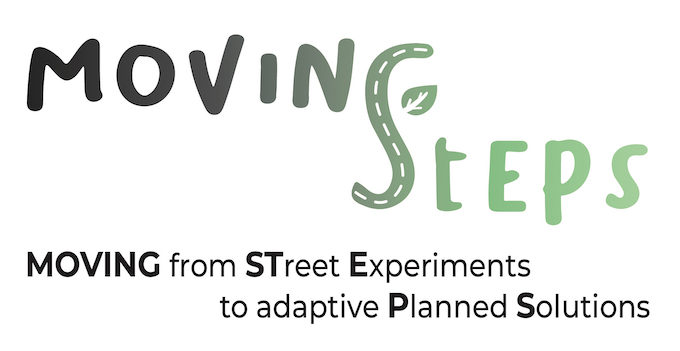The project MOVING StEPS – MOVING from Street Experiments to adaptive Planned Solutions (CUP MASTER Code: D53D23011060006) is supported by the MIUR (Italian Ministry of Education, Universities and Research) and it is financed with the PRIN 2022 programme.

Abstract
The National Recovery and Resilience Plan (NRRR) allocates significant resources to sustainable mobility with ambitious objectives, mostly aimed at developing more sustainable urban mobility solutions. Decarbonisation actions, shared and active mobility forms are also strongly intertwined with major challenges that contemporary cities are facing: environmental sustainability, energy transition, resilience, social inclusion and equity, accessibility and post pandemic issues. These challenges inevitably imply an integration between urban and mobility planning to boost liveability of public spaces and accessibility to proximity services.
Within this framework, MOVING StEPS focuses on the role that bottom-up and temporary street experiments (parklets, play streets, intersection repairs, open streets, pavement to plazas,…), are acquiring to reclaim places for social interaction, proximity and accessibility, e.g. by narrowing carriageways and converting parking lots or residual road spaces into new public and social spaces, like in the case of parklets.
The project aims at defining criteria and planning guidelines on how to move from bottom-up and temporary street experiments to durable transformations and adaptive planned solutions for the reorganisation of the urban space, creating at the same time opportunities for widespread desealing actions, therefore increasing urban greenery and climate change adaptation in cities. Each proposal will be assessed also through urban quality indicators.
In this perspective, MOVING StEPS is aligned with the European Union’s Directives on project issues (EU Mobility and Transport, 2022). Furthermore, political and economic implications of MOVING StEPS will define a social framework in line with European goals, planning and programming Directives (Agenda 2030, Rio + 20, COP-26).
After a literature review and a comparative analysis of the firsts temporary street experiments and parklet experiences in European cities, MOVING StEPS will define location, performance, and infrastructural factors that can influence the implementation of street experiments and parklets, and at developing appropriate urban and mobility planning tools for the implementation of adaptive planned solutions to convert residual street spaces into social spaces. This research will be mainly addressed using a wide range of social sciences methods (best practices analysis, pilot cases, GIS Data collection, questionnaires, SWOT), but also by seeking innovative and interdisciplinary actions through an integration with scenario, modelling and optimisation methods aimed at properly defining optimal locations for the adaptive planned solutions.
Finally, among the exploitation activities, the project will set up an e-learning course, e.g. on the model of Massive Open Online Courses (MOOCs), to disseminate the know-how on the planning of adaptive street space reorganisation solutions among a wide range of potential stakeholders.

Principal Investigator: Silvia Rossetti
Total Contribution: 248,132 euros
Project Duration in months: 24
Start Date: October 18, 2023
End Date: October 18, 2025
Follow the project on Facebook ![]() and/or on Instagram
and/or on Instagram ![]()
